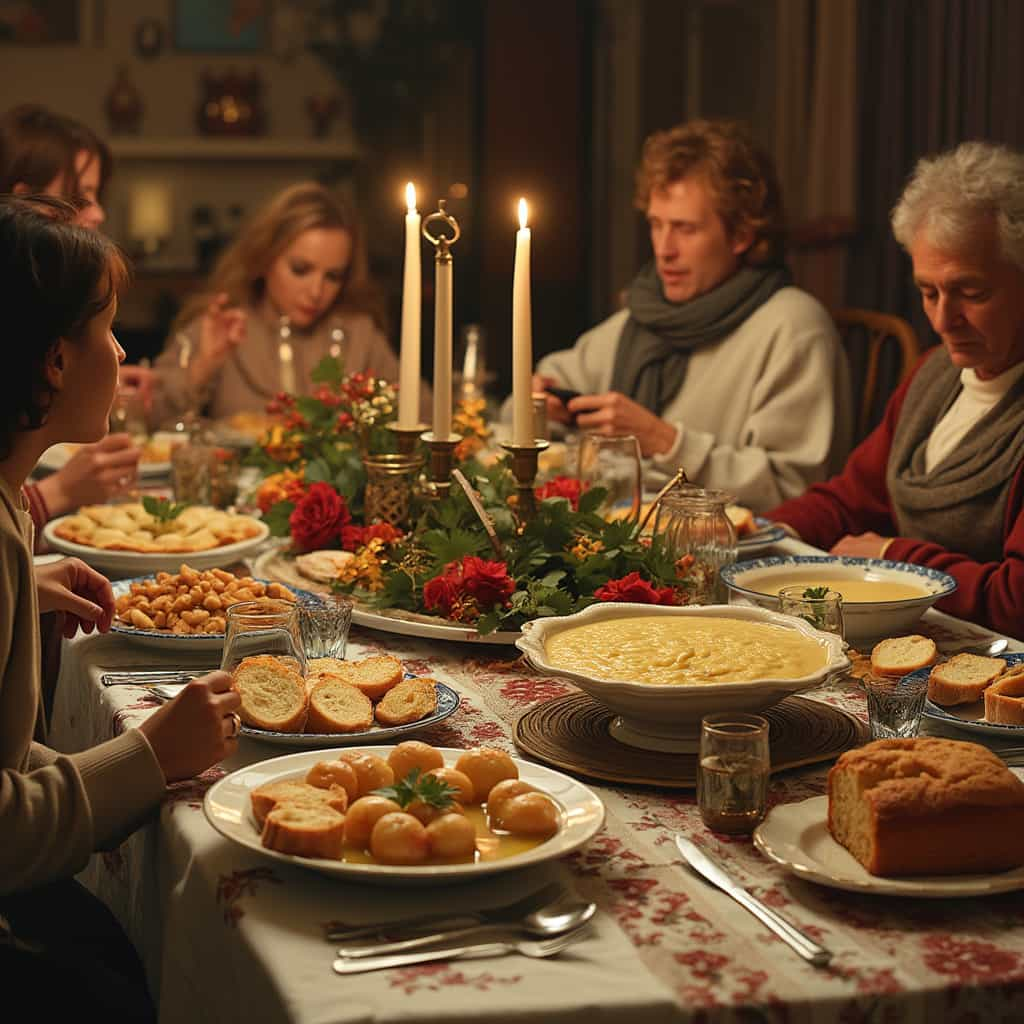December 8th is a date of great significance for Catholics and, in particular, for the Italian people who celebrate it in honor of the Immaculate Conception . This holiday not only contains a deep religious value but is also a time of family reunion and celebration through cuisine . In Italy, the culinary traditions associated with this day vary greatly depending on the region, enriching the gastronomic panorama of the country.
In the Campania region, one of the most beloved traditions is the preparation of the so-called 'baccalà' , which is cooked in various ways, from stewed to fried. Legend has it that the choice of baccalà dates back to the times when believers in Naples wanted to respect the tradition of not eating meat on the day of the Immaculate Conception.
In the north , however, especially in Lombardy and Piedmont , you can find a characteristic dish called 'polenta con bruscitt' . This rich and substantial dish allows you to savour peasant cuisine , made with simple and genuine ingredients . According to historians , polenta has ancient origins and dates back to pre-Roman times , while bruscitt is a sign of the culinary tradition of village festivals .
In Emilia-Romagna , tradition leads families to prepare tortellini , often in broth . The preparation of these small ravioli is a collective ritual that involves not only women, but also the men of the house, who come together to give life to recipes handed down for generations . The tortellino, with its filling rich in meat and cheese , symbolizes the conviviality and hospitality of Emilian cuisine .
Another iconic dish is the 'pandoro' or 'panettone' , which in many regions is made to celebrate the Immaculate Conception. Although the tradition of these sweets is linked to Christmas, many families prepare them in advance to symbolize the sweetness of the arrival of the holiday . Panettone , originally from Milan , has a fascinating history that dates back to the fifteenth century and contains within itself the entire Italian Christmas tradition .
We cannot forget the traditions linked to marzipan sweets , very popular in Sicily , where December 8 is also celebrated with tufts of sweet almond paste . These sweets are not only a delight for the palate but also symbolize the celebration and rebirth of nature , in perfect synchrony with the message of hope linked to the Immaculate Conception .
But the significance of this day is not limited to Italy. In Spain , December 8th marks the feast of the Immaculate Conception and families prepare local specialties such as 'tortas de aceite' , typical sweets that reflect the Andalusian gastronomic culture . Similarly, in Mexico , the innocent 'Día de la Virgen de Guadalupe' is celebrated, where tables are filled with typical Mexican dishes such as 'mole' and 'tamales' .
In France , the Immaculate Conception is celebrated with special attention to desserts such as the 'galette des rois' , a traditional puff pastry dessert that involves social participation : whoever finds the 'fève' inside the cake is crowned king or queen for a day . This is a tradition that brings families and friends together around a table , revealing the importance of conviviality at this time of year.
Some food experts, such as the famous Italian chef Gualtiero Marchesi , suggest that these food traditions are fundamental not only for their historical value , but also for their role in strengthening family and community bonds . According to Marchesi , food is a universal language that tells stories and traditions, uniting people of different generations .
Of course, the culinary journey of December 8 is not limited to Italy but embraces different cultures and traditions around the world. In every corner of the planet, this day is celebrated with dishes rich in meaning, symbolism and history . Whether it is cod from Campania , polenta from Piedmont or Mexican sweets , December 8 is a holiday that, through food, unites people and celebrates cultural identity .
In conclusion , the feast of the Immaculate Conception is an occasion to share traditional dishes and community values . Families gather around laden tables to savor the culinary riches of their regions , thus passing on customs that enrich not only the palate but also the spirit . December 8, therefore, is much more than a culinary celebration; it is a moment of unity , celebration and love for traditions .
You may also like
Electric, Gas and Microwave Ovens: Three Ways to Perfect Cooking
The article explores the features, differences and benefits of electric, gas and microwave ovens, providing a detailed analysis of the options available for modern cooking. The approach aims to guide consumers in making an informed choice of the oven best suited to their cooking needs.
The Complete Guide to Growing Tomatoes: From Planting to Harvest
Learn how to grow tomatoes effectively by exploring the different types of plants, the stages from sowing to harvest, the ideal climate, suitable soils, natural fertilizers and the problems to face.
The Best Planetary Mixers on the Italian Market: Find Out Which One is Right for You
A detailed guide to the best planetary mixers available in Italy, with in-depth analyzes of the characteristics, strengths and weaknesses of each model, followed by a delicious recipe to inaugurate your new purchase.
Treating your teeth with food: which foods damage and which strengthen your teeth?
Find out which foods can cause dental problems and which are beneficial for oral health. We delve into the negative effects of sugary and acidic foods, and reveal foods that can help you strengthen your teeth and keep them healthy.
